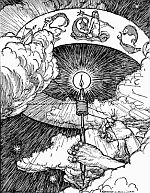 In one sense, as believers in Christ, we are to be accepting and loving toward those who do not know Christ. Yet we also have doctrinal convictions and beliefs that counter those who differ with us and we are to oppose them (lovingly of course). Jesus put it like this: “Behold, I am sending you out as sheep in the midst of wolves, so be wise as serpents and innocent as doves” (Matthew 10:16). We are to go out preaching the Gospel in its full array of hard truths (original sin, total depravity, just wrath, hell, substitutionary atonement, justification through faith alone in Christ alone, all of which is made possible by grace alone) and yet we are to be innocent as doves in our speech and conduct toward them. We are not to be deceived by false teaching and even more so, we are to oppose it, but do so with reverence, gentleness, and respect (1 Peter 3:15).
In one sense, as believers in Christ, we are to be accepting and loving toward those who do not know Christ. Yet we also have doctrinal convictions and beliefs that counter those who differ with us and we are to oppose them (lovingly of course). Jesus put it like this: “Behold, I am sending you out as sheep in the midst of wolves, so be wise as serpents and innocent as doves” (Matthew 10:16). We are to go out preaching the Gospel in its full array of hard truths (original sin, total depravity, just wrath, hell, substitutionary atonement, justification through faith alone in Christ alone, all of which is made possible by grace alone) and yet we are to be innocent as doves in our speech and conduct toward them. We are not to be deceived by false teaching and even more so, we are to oppose it, but do so with reverence, gentleness, and respect (1 Peter 3:15).
However, in our modern day in age, the Protestant evangelical church, to a large degree, has capitulated to the culture, inviting in its pagan practices and belief systems, as orthodox teaching even. What do I mean? Well, let’s consider the millions of “FW: Fw: Fw:” emails circulating the globe right now, sent by those from within Protestant evangelical churches. Most of these entail some form of superstition or myth, that if you do X then Y will happen, without any regard for a sovereign God who rules all things by His powerful word. In addition, many of these emails are already documented as being false out on www.snopes.com (check it out).
But regardless, the principle is that something can be said about what is being taught (or not being taught) nowadays in our churches concerning who God is and how He has acted in history through Christ to redeem us from God’s impending wrath. Something can be said about the teaching because it has resulted in “believers” folding to these mystical “Christian” emails, believing them to be true. I can’t tell you how many of these my dad receives from people within his own evangelical Bible study group. I had to just ask people to quit sending them to me, or in most cases I would find the snopes.com article speaking about that particular email and reply to all with the link. They stopped coming in quickly. I mean it’s not true, right? Why should things that aren’t true spread around as if they were? But that is not my main point.
Something else concerned me today that prompted me to write this entry. I noticed a Facebook group entitled, “100,000,000 Christians Worship God!” And while I certainly hope that is true (while remaining cautious as to the truthfulness of that), something confirmed my cautiousness. I noticed many of the comments on the forums saying things along the lines of, “Are we Baptists, Methodists, Catholics, etc. or are We CHRISTIANS? Too many times we get all worked up in denominations, that we forget we are all brothers and sisters in Christ, we are Christians indeed. Why do we continue to put down one another, we all have our faults in the denomination.” Yes the church is imperfect. Yes the church has rough edges, in every denomination. Yes, even Reformed denominations and circles for sure. :] But is there not a good reason, in many cases (though not all), for denominational splits?
A quote from Monergism.com’s Bad Theology section says this: “Divisions and separations are most objectionable in religion. They weaken the cause of true (Gospel) Christianity…But before we blame people for them, we must be careful that we lay the blame where it is deserved. False doctrine and heresy are even worse than schism. If people separate themselves from teaching that is positively false and unscriptural, they ought to be praised rather than reproved. In such cases separation is a virtue and not a sin.” Yet this is lost nowadays on our Christian culture at large.
This is where the evangelical church has capitulated to the pagan culture around us and its ideas. How? Instead of holding fast to the Christian understanding of tolerance, to a large degree, we have adopted their understanding of tolerance. This was set in stone for me on the group itself where it gave rules for the members: “If you or anyone is known to say or write anything unkind or negative to anyone in our group we will ban them IMMEDIATELY upon notification.” Now of course, the rule should stand in the instances where people say unkind and things to others, so as to harm them personally. That should not be tolerated. And of course, trying to manage that for 400,000+ users is next to impossible. However, that’s not my point. It was the addition of something in the rule that I think is revealing. Did you see it? “Anything … negative.” Anything? Really? Even doctrinal disagreements that hit at the root of how people are saved and get into heaven for eternity? Hmm. Is this not the adoption of something that our secular culture values, that is moral and religious relativism?
During the 16th century, there was this little theological schism in the catholic (universal) church called the Reformation. Heresy was the issue at hand, heresy having to do with how people are saved, literally, for eternity. And while I personally desire for all to be saved and to come to a knowledge of the truth, the uproar in the Reformation was over this very issue: how are people to be saved from God’s wrath? Catholics and Protestants fundamentally disagree over how people are saved. Luther was condemned as a heretic at the Diet of Worms. I hold to Luther’s teachings on the Gospel. To Protestants he should be considered one for whom the world was not worthy for standing strong against false teaching and upholding the Gospel. We do have affirmations together with Roman Catholics on the Trinity, the two natures of Christ, and several other important distinctions that can be made over against other religions (like the Mormons, JW’s, and others who would claim to be under the title of Christianity). But are these enough to unite us? No. They go further to talk about certain, extra-scriptural requirements placed upon the work of Christ, if we are to be saved.
We drastically differ on the nature of salvation itself with the Roman Catholics. This is not an unimportant distinction as most seem to think. This is not something we can just look over. This affects our ability to stand together as one people in Christ with Roman Catholics because we both view each other as heretics (heretics being those who believe doctrines that will take them to hell). Yet it seems those who claim to be Protestant evangelical Christians don’t get this at all, which just makes you have to really wonder about their own understanding of the Gospel to begin with (justification by grace alone through faith alone in Christ alone), though of course you cannot necessarily paint everyone with a broad brush, I know.
Regardless, it seemed a majority of people in the group forums were making many of the same statements (though I only read a handful of the thousands of comments) concerning our unity with Roman Catholics in particular, as well as other denominations, that by Biblical, historical, Gospel, confessional standards, are anathema (accursed), enemies of God, enemies of the cross, because they reject the Gospel message itself in their teaching and preaching, either implicitly or explicitly. “They have a form of godliness while denying its power” (2 Timothy 3:5). Some of the few comments I actually appreciated were those coming from some Roman Catholics opposing the Protestants for trying to bring about this unity. I found this interesting, because the argument by the Roman Catholics was that we Protestants have abandoned the “real” church (Rome) and have no right to call together unity. I agree, not that we have abandoned the real church, but that we have no right to call together unity.
We Protestants, as a group, deny their doctrines that only the Roman Catholic Church can interpret Scripture for us, that she is infallible. We believe in Sola Scripura, that the Scriptures alone are the sole, final, infallible authority for the life and practice of the church. We deny their Eucharist because in it is a most pernicious belief that Christ is re-sacrificed each week at Mass. We deny that Christ’s atonement is incomplete and that only the priests can stand in between us and the Savior. This flies in the face of Hebrews 10:11-13 which reveals that Roman Catholics have simply re-instituted the Jewish sacrificial system all over again each week in their Mass, but instead now, the sacrifice is the “incomplete” work of Christ, at least according to them. And as far as the priests are concerned in the Church of Rome, Christ alone, not a sinful priest, is our intercessor. No man can stand in between us and God. The only One who can, who is qualified, is Christ Himself. The way has been opened, the temple curtain torn in two by His work on the cross. He is our great High Priest. Through the work of Christ alone, we have full, unfettered access to the throne of God above, when outside of it, only wrath and a fury of fire remains.
Surprisingly, even the Roman Catholics (at least those true to the Roman Church) are getting the point in the forums, the very point I’m trying to make: there is and can be no unity between Catholics and Protestants on the basis of the fact that we both have serious doctrinal disagreements on the nature of salvation itself! They see the real issue at hand here: eternity, either with or without God. Maybe we should wakeup too and recover the Gospel in our groups before it is lost amongst our denominations altogether.
All of this in turn makes me consider whether there are 100,000,000 Christians (saved, regenerate, actually believing, Christians) worshipping God right now (through faith alone in Christ alone, the only way to truly worship God to begin with, is it not? (Romans 14:23) if these people claiming to be Christians believe there are other acceptable views within Christianity of how we are saved; and, if they believe there to be no important disagreement on fundamental soteriological (salvation) issues. Yes yes, I cannot know anyone’s heart. I agree with you. No one, not even the person, can really know the heart, but only God knows. Here’s a distinction though: you can know what someone believes (at least outwardly, at face value) by what they state personally as their beliefs, can you not? Is that not what doctrine is, a stated belief in words, sentences, you know, language, that we use to communicate ideas and concepts to others? This seems to be lost now though in our mystical, culturally inclusive, relativistic Christian culture.
Yes, I wish the church could be universal in the sense that there were no denominational splits. But unfortunately, we do not have that luxury, because within many of these different denominations are false doctrines and heresies by which people are being blinded from the very Gospel itself and led straight to hell. That seems to me to be quite important, trumping this postmodern, cultural desire for what really amounts to false unity to begin with. This is frightening and should strike fear in us as believers that we be faithful to the Apostolic Gospel message delivered to us in the Scriptures.
I cannot stand in worship with Catholics or other (theologically liberal or relativistic) denominations even who deny we are saved by grace alone through faith alone in Christ alone. I will not. Because I’m theologically arrogant? Not at all. I’m a sinner saved by grace alone. How could I possibly be arrogant if God is the One who saved me when I wanted nothing of Him, blind and depraved, turned away from Him? I cannot. This has everything to do though with the very Gospel itself by which we are saved. We lose that, then what is the point of the church? I will not stand with those who differ on these points because we believe we are saved in two entirely different ways. One is supernatural, the other is fleshly. One is by divine intervention, the other we climb the latter of works to be acceptable. One is by Grace Alone through the finished work of Christ; the other is faith plus works you do to get in good with God (which is just smoke and mirrors for humanistic, man-accomplished salvation really).
Within many denominational splits lies important theological (belief) distinctions that must be understood. If someone says this is unimportant, they have clearly adopted the modern pagan postmodern cultural understanding that doctrines and creeds should be eradicated because, “We can’t really know anything for sure can we?” This is sad, mainly because church history is full of people who died, were tortured, let their families be split apart, all for theological distinctions and doctrine even, because they knew the glory of Christ was at stake. Would those early church doctors and fathers who have gone on to be with the Lord before us say the doctrines for which they willingly perished were unimportant? I think not.


 Some persons love the doctrine of universal atonement because they say, “It is so beautiful. It is a lovely idea that Christ should have died for all men; it commends itself,” they say, “to the instincts of humanity; there is something in it full of joy and beauty.” I admit there is, but beauty may be often associated with falsehood. There is much which I might admire in the theory of universal redemption, but I will just show what the supposition necessarily involves. If Christ on His cross intended to save every man, then He intended to save those who were lost before He died. If the doctrine be true, that He died for all men, then He died for some who were in hell before He came into this world, for doubtless there were even then myriads there who had been cast away because of their sins.
Some persons love the doctrine of universal atonement because they say, “It is so beautiful. It is a lovely idea that Christ should have died for all men; it commends itself,” they say, “to the instincts of humanity; there is something in it full of joy and beauty.” I admit there is, but beauty may be often associated with falsehood. There is much which I might admire in the theory of universal redemption, but I will just show what the supposition necessarily involves. If Christ on His cross intended to save every man, then He intended to save those who were lost before He died. If the doctrine be true, that He died for all men, then He died for some who were in hell before He came into this world, for doubtless there were even then myriads there who had been cast away because of their sins. “And as he came out of the temple, one of his disciples said to him, ‘Look, Teacher, what wonderful stones and what wonderful buildings!’ And Jesus said to him, ‘Do you see these great buildings? There will not be left here one stone upon another that will not be thrown down.'” –
“And as he came out of the temple, one of his disciples said to him, ‘Look, Teacher, what wonderful stones and what wonderful buildings!’ And Jesus said to him, ‘Do you see these great buildings? There will not be left here one stone upon another that will not be thrown down.'” –  Earlier, I was talking with my brother, Stephen (who is in Baghdad right now with the Army) on instant messenger. We were talking about the Gospel and how we must be constantly fighting to center every facet of our lives upon it. Our conversations, our relationships, our marriages, our toil, our pain, our struggles, our blessings, our families, everything. Otherwise, we risk either falling into antinomianism, that is, the abuse of God’s grace with total disregard for obedience and submission to Him, or legalism, that we try and please God with our actions as the basis for our relationship with Him, which fails constantly. Both of these errors oppose the Gospel itself because both say, “I am my own Lord and Savior.”
Earlier, I was talking with my brother, Stephen (who is in Baghdad right now with the Army) on instant messenger. We were talking about the Gospel and how we must be constantly fighting to center every facet of our lives upon it. Our conversations, our relationships, our marriages, our toil, our pain, our struggles, our blessings, our families, everything. Otherwise, we risk either falling into antinomianism, that is, the abuse of God’s grace with total disregard for obedience and submission to Him, or legalism, that we try and please God with our actions as the basis for our relationship with Him, which fails constantly. Both of these errors oppose the Gospel itself because both say, “I am my own Lord and Savior.” In reading this verse tonight, I could not help but think about the Osteen’s of the American evangelical landscape and their version of the “gospel” which has been totally emptied of all Biblical content. As my dad said recently, and I agree, if you were to take out all of the Bible-words (church, Jesus, God, etc) of their message, you would basically be left with a corporate pep rally, where you have a motivational speaker who encourages unity, who at all times speaks in merely positive terms, uses entertainment for energizing the people, and gets employees fired up to go back into the workplace and do their best. No different is the message of these “preachers”. The only difference is the eternal Christ who became flesh and bore the full cup of the wrath of God on the tree is used as a means to an end, of showing people how they can have their “Best life now”. What about that is the Biblical Gospel by which we are saved, and by that alone?
In reading this verse tonight, I could not help but think about the Osteen’s of the American evangelical landscape and their version of the “gospel” which has been totally emptied of all Biblical content. As my dad said recently, and I agree, if you were to take out all of the Bible-words (church, Jesus, God, etc) of their message, you would basically be left with a corporate pep rally, where you have a motivational speaker who encourages unity, who at all times speaks in merely positive terms, uses entertainment for energizing the people, and gets employees fired up to go back into the workplace and do their best. No different is the message of these “preachers”. The only difference is the eternal Christ who became flesh and bore the full cup of the wrath of God on the tree is used as a means to an end, of showing people how they can have their “Best life now”. What about that is the Biblical Gospel by which we are saved, and by that alone?
If We Go on Sinning Deliberately
By David Westerfield
On April 24, 2008
In Theology
Excerpt taken from http://cicministry.org/commentary/issue65b.htm
For if we go on sinning willfully after receiving the knowledge of the truth, there no longer remains a sacrifice for sins, but a certain terrifying expectation of judgment, and the fury of a fire which will consume the adversaries. Anyone who has set aside the Law of Moses dies without mercy on the testimony of two or three witnesses. How much severer punishment do you think he will deserve who has trampled under foot the Son of God, and has regarded as unclean the blood of the covenant by which he was sanctified, and has insulted the Spirit of grace? (Hebrews 10:26-29)
While there are several issues evident within this complex passage, I wish to focus on the term “sinning willfully” in verse 26. Many have struggled with what exactly the author of Hebrews is trying to convey with this term. The confusion proceeds from the fact that every “sin” is indeed done “willfully” in the sense that all who “sin” do the act of their own volition, thus “willfully” in one sense of the word. Furthermore, the Apostle John makes it quite clear: “If we say that we have no sin, we are deceiving ourselves and the truth is not in us” (1 John 1:8). Thus, if we are to maintain that the Scriptures are consistent in its unified message, “sinning willfully” must have some other meaning than that noted above. The question then is: “What does the author of Hebrews have in mind when he writes the term: “sinning willfully”?
Light is cast on this difficult passage when we realize that the author of Hebrews is most probably alluding to a distinct yet similar warning found in the Old Testament. In Numbers 15 we find that those “under the law of Moses” were given instruction and warning regarding “sinning unintentionally” and “sinning willfully.” Note the following:
Also if one person sins unintentionally, then he shall offer a one year old female goat for a sin offering. The priest shall make atonement before the Lord for the person who goes astray when he sins unintentionally, making atonement for him that he may be forgiven. You shall have one law for him who does anything unintentionally, for him who is native among the sons of Israel and for the alien who sojourns among them. But the person who does anything defiantly, whether he is native or an alien, that one is blaspheming the Lord; and that person shall be cut off from among his people. Because he has despised the word of the Lord and has broken His commandment, that person shall be completely cut off; his guilt will be on him (Numbers 15:27-31).
Therefore, since the author of Hebrews clearly notes that he is making an analogy to the punishment of those who “set aside the law” (vs. 28-29), we get a somewhat clearer picture of what he means by “sinning willfully.” Since there was a distinction in the Old Testament regarding those who had received the revelation of the Lord through Moses of “sinning unintentionally” and “sinning defiantly,” the author of Hebrews makes the following point analogous to the Old Testament instructions and warning: If those who defiantly spurned the Law after receiving the knowledge of its truth were put to death, how much greater will be the punishment of those who defiantly spurn the Gospel of Jesus Christ after receiving the knowledge of its truth.
After carefully examining the passage and the roots that the author of Hebrews is relating it to, it becomes evident the definition of “sinning willfully” carries with it the meaning of one who defiantly blasphemes the Gospel after accepting the concept that it is indeed true. When this is done, only a fearful expectation of the eternal judgment of God remains for that individual.